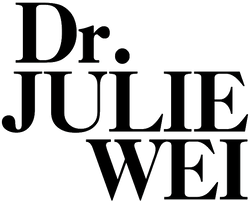I never thought that my desire to pursue a career in medicine had anything to do with conversations. I wanted to become a doctor for many reasons. If you read A Healthier Wei, you might guess that losing my mother to breast cancer may be a subconscious factor which drove me to become a physician. Other factors include family and cultural expectations as the medical profession is regarded as perhaps the most prestigious of all professions. Never, did I realize that my career would really boil down to having conversations.
My medical school, residency, and fellowship training never taught me about “conversations.” I certainly received intense training about how to interview a patient, perform a thorough physical exam, develop a list of “differential diagnosis” or what I think are the most likely causes of the patient’s symptoms based on the history and exam, what test(s) to order, and how to best treat the patient. My training taught me to speak professionally with the patients, but I had never viewed these thousands of office visits as “conversations.” It is my job as the physician to “tell” the patients what would be best for them, and still may be. What has changed is that the past several years I have learned that I am a better physician and can better help my young patients and their families by having a conversation with them.
I like to talk, just ask my husband. I remember early on when we were dating, he posed this challenge for me: “What if every person had only a finite number of words given to them for a lifetime, and once they use them up they die…”, it made me pause for just about 3 seconds, and then I said, “Well, I would die young but happy.” A conversation, I have learned, is about equal exchange between the two parties involved. More importantly, not only are they both speaking, it involves that the party who is not speaking is actually really listening. This part I am working on every day to do better at. I have learned that having conversations with parents is the most important way I can help change how our children are fed and provide guidance and information on what may help decrease their symptoms caused by The Milk and Cookie Disease. It was learning to really listen, to the parents, who would share with me all the details about what their child was experiencing (even though I was overbooked and our appointment times and structure was never designed to foster conversations) that allowed me to develop my career epiphany. Subsequent conversations about how change in diet and dietary habits resolved so many symptoms such as chronic stuffy nose and cough, and many other “illnesses” which allowed me to truly believe in not only the absolutely importance of diet, but in the power of having conversations.
Conversations are not just important in my life and my work, but most importantly in our households. Each day, parents have endless conversations with their children, no matter what age. Those conversations can often seem very one-sided orders and instructions as it is at my house, “eat faster,” “put your stuff away,” “can you please do what I ask you?” which are really not conversations. I am learning to have better conversations with Claire, when we sit and have eye contact, when I am not multi-tasking, and I explain the importance of making good choices about the school lunch menu or why I roasted beets, sweet potato, carrots, and sautéed broccoli for dinner along with couscous on Wednesday night for a healthier dinner. A good conversation with Claire allowed her to ask questions and share with me her feelings about that meal, and whether she liked it or not, and how to prepare that. Our conversation in the car last night allowed me to smile and chuckle as I realized she has a crush on a new boy in her class! My best moments with my daughter has been when we have conversations, and I must have more of them with not only her but my husband Dave.
Why are having conversations so hard? It is because conversations take intention, awareness, time, and effort. In our house, I struggle to have conversations because I am a full-time working surgeon/physician and part-time mom, who cooks, does laundry, manages our social calendar, check homework, work on my research and now my book/facebook/twitter etc, and don’t forget exercise and personal hygiene like a daily shower! Having a conversation with my husband is so hard, because it is easier just to only talk about what we need to discuss to get through our daily lives and complete “tasks” of daily living for the three of us. Yet, when I have conversations with Dave, that’s when I truly value him and our marriage.
I truly believe that in order for preventive care to work, to impact our nation’s health care delivery system, to empower families to change their own eating habits and that of their children, to reduce obesity in this generation of children, to get kids off of medications, to reduce misdiagnosis and overmedication, to boycott terrible processed foods with too much sugar and other toxins, to believe that every person can reclaim their health and live in A Healthier Wei, then we need to take the time and live in the moment, and have conversations. Physicians do not have “time” to have conversations, but it is not about time, it is a mind-set. We must think differently for these challenging times that face us as people and as a society. Have a conversation or two today, with your loved ones and your friends, and share this message.
